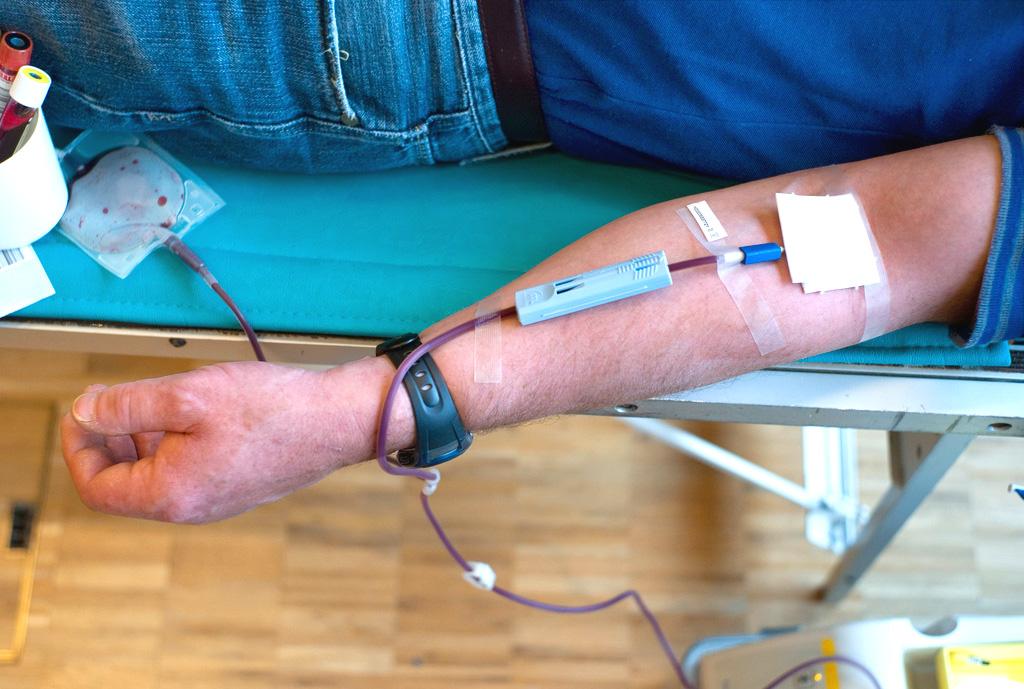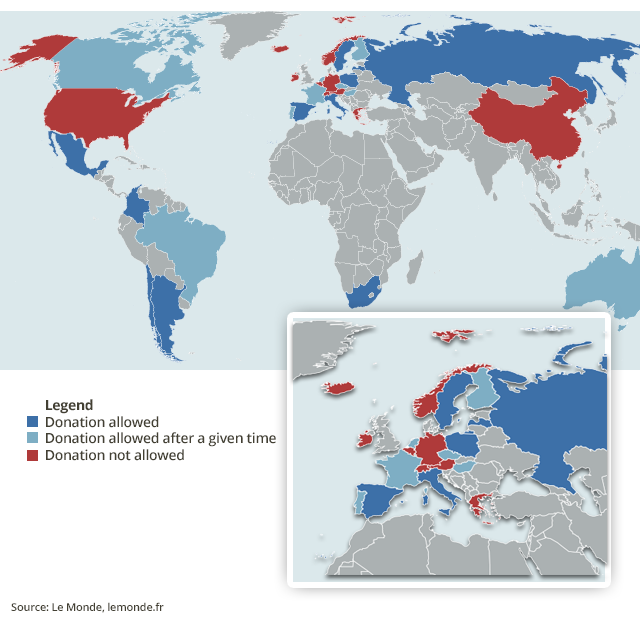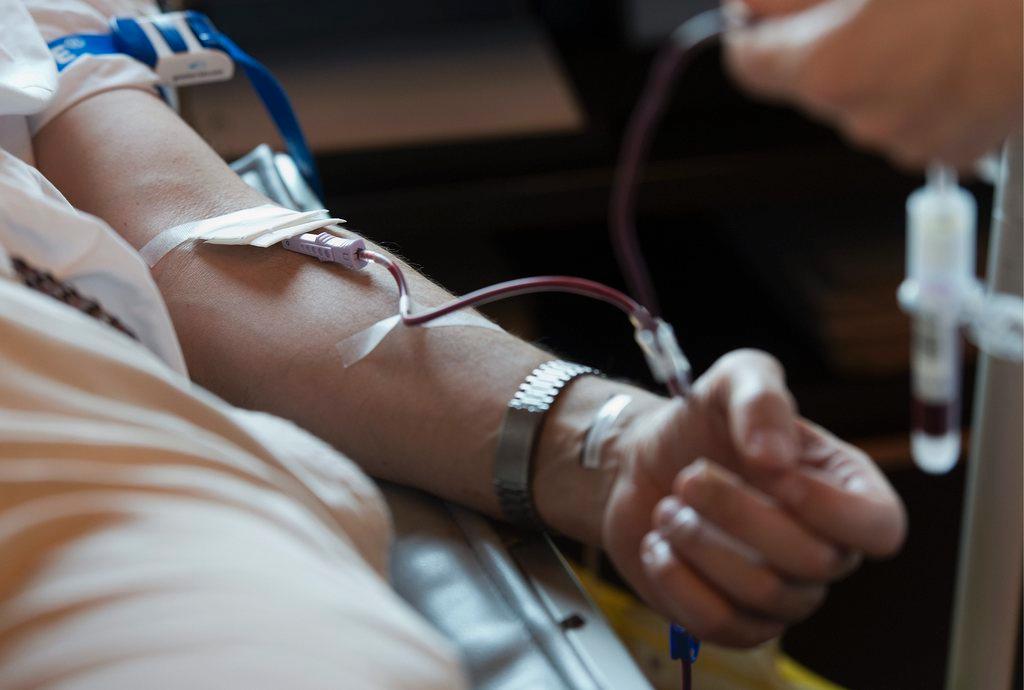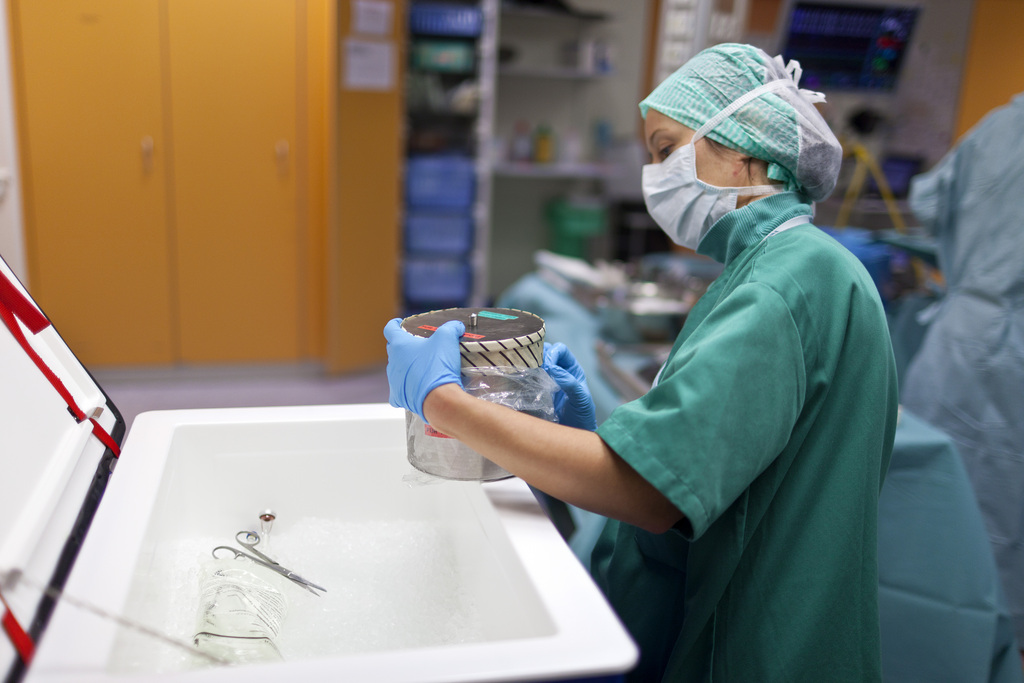Calls for change intensify amid bans on gay blood donors

Forced to cheat in order to help: this is the reality for gay men in Switzerland, who have been barred from donating blood – as a precautionary measure – since the start of the AIDS epidemic. But there are growing calls for this ban to be lifted.
“Have you ever engaged in the following? Sexual relations between men since 1988.” All would-be blood donors in Switzerland must first reply in writing to this question, among around 20 others. Those who tick the “yes” box may not donate blood.
“My friends and I have often lied in order to donate our blood,” admits Stoyan.* The 29-year-old from Bern doesn’t understand why his blood is not accepted. “The ban makes sense for those who have multiple sexual partners, but this kind of behaviour has nothing to do with homosexuality.”
A year of abstinence to give blood
In Switzerland, “men who have sex with men” are known by the acronym MSM. They have been banned from giving blood since 1988 because of the risk of transmission of AIDS. Now several European countries, namely Italy, Spain, Portugal and Poland, have revoked this rule and decided to allow homosexuals to give their blood without restriction. Others have lifted the ban but imposed strict restrictions.

The most recent example is France. In November of last year, France decided to allow homosexuals to donate their blood from spring 2016,External link but with certain conditions. Only those who have not had sex with another man for 12 months will be able to give blood. Homosexuals will also be allowed to give their plasma – the liquid part of the blood – if they are in a stable relationship or have been abstinent for four months.
French authorities are following a step-by-step approach. Marisol Touraine, France’s health minister, plans to conduct a study of the new donors. “If there are no risks, the rules that apply to homosexuals will be brought into line with the general rules the year after,” she says. Via her Twitter account, Touraine also welcomed the end of what she called “discrimination and a taboo”.
A source of stigmatisation
But those reforms don’t have French defenders of the homosexual cause jumping for joy. Many criticise that the conditions for giving blood are not the same for everyone.
SOS Homophobie, an association that defends LGBT (lesbian, gay, bisexual and transgender) rights in France, protested that “this development does not put an end to the stigmatisation of gay men and thus sustains homophobia”. The organisation advocates introducing “criteria based not on the concept of ‘population at risk’ but of ‘risk behaviour”.
Pink CrossExternal link, the umbrella organisation for homosexual groups in Switzerland, shares this view and also finds the ban discriminatory. “The rule is hypocritical. For purported safety reasons, a whole section of society is being excluded,” regrets Pink Cross Co-President Mehdi Künzle.
He believes that SwissmedicExternal link, the authority in charge of supervising blood transfusion services and approving new rules in the field, “must stop vetoing every attempt to discuss the issue, so as to make way for a factual and calm debate”.

More
Gays defy ban on giving blood
Condition or hidden ban?
Many other voices in Switzerland are demanding that blood donation be opened to MSM, and several parliamentary motions have already been filed to that end. Last autumn the government showed itself open to change when it answered an inquiry by a member of the centre-right Radical Party with “all efforts must be made so that risk behaviour, and not sexual orientation, becomes the grounds for exclusion”.
Swiss Transfusion SRC,External link the blood transfusion service of the Swiss Red Cross, is studying the possibility of easing the ban. One option would be to follow the French model, although the director of the service, Rudolf Schwabe, is not convinced. He finds France’s 12-month abstinence period “absurd” for homosexuals wishing to donate blood.
“This condition is tantamount to a ban, although it is less discriminatory. No one is going to abstain from sex for a year for the sole purpose of giving their blood,” he said.
Swiss Transfusion SRC supports the establishment of criteria based on donors’ habits and not their sexual orientation. The organisation has sent a request for amendment of the donation rule to Swissmedic, which has yet to make a decision.
Schwabe is optimistic. “I am convinced that we will succeed in changing the rules by early 2017.”
Swissmedic denies discrimination
So far, however, Swissmedic has proven uncompromising. It has already rejected two proposals from Swiss Transfusion SRC and does not intend to be influenced by the easing of the rules in other countries.
“The rules in Switzerland are based on the situation and scientific data in Switzerland,” states Swissmedic spokesman Peter Balzli in a written position paper, denying any discrimination. Citing figures from the Federal Office of Public Health, he recalls that “MSM are nearly 30 times more likely to be infected by HIV than the general population”.
Balzli adds that Swissmedic “does not refuse to discuss the issue” and that the organisation is required to reassess the criteria for exclusion from blood donation if such a request is made. A change in policy could, for example, arise if a vaccination against the HIV virus were to come onto the market in Switzerland, or if the infection rate among MSM were to drop considerably.
However, the trend is actually the opposite, according to Balzli. The latest evaluation found that three out of every 1,000 people living in Switzerland were infected with HIV, whereas among MSM, the proportion rose to 100 out of every 1,000. “Sexual relations between men must therefore always be considered a risk behaviour,” he concludes.
AIDS specialists, meanwhile, also contest the ban. Alexandra CalmyExternal link, head of the HIV-AIDS unit at the Geneva University Hospitals, considers the measure discriminatory. “There is indeed a high rate of new HIV diagnoses among homosexual men,” she says. “But this does not justify the ban.” She adds that this should instead be based on an evaluation of risk behaviour.
*name known to the editors
Gay men are not the only ones excluded from giving blood in Switzerland. You are also banned if you inject drugs, have multiple sexual partners or have had a new partner for less than four months, or have had an HIV-positive partner. You may also not donate blood if you suffer from syphilis or Hepatitis B or C.
To donate blood, you have to first fill in a form and then pass an interview with a medical expert.
Every unit of donated blood undergoes laboratory testing for possible pathogens, but these tests are not a guarantee of 100% safety. This is because there is a “diagnostic window”, i.e., the period of time after contraction of the disease in which the disease cannot be detected. For HIV this is 12 days.
The last case of HIV infection via a blood transfusion in Switzerland was in 2001. The donor was heterosexual.
(Source: Swiss Transfusion SRC)
Translated from French by Julia Bassam

In compliance with the JTI standards
More: SWI swissinfo.ch certified by the Journalism Trust Initiative



You can find an overview of ongoing debates with our journalists here. Please join us!
If you want to start a conversation about a topic raised in this article or want to report factual errors, email us at english@swissinfo.ch.